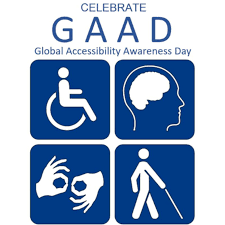 Thursday, May 18th, 2023 is Global Accessibility Awareness Day (GAAD). This international venture is celebrating its 12th year raising awareness and promoting the importance of digital accessibility.
Thursday, May 18th, 2023 is Global Accessibility Awareness Day (GAAD). This international venture is celebrating its 12th year raising awareness and promoting the importance of digital accessibility.
We rely on the internet and digital materials for everything – information, communication, entertainment, shopping and more. However, for the One Billion people across the world that have some type of disability, inaccessible materials can limit or block participation in online activities – including education.
To celebrate GAAD, schools, businesses and other organizations across the globe are hosting events and activities to help get everyone talking, thinking and learning about digital access and inclusion.
While not all disabilities impact online activities, many can create difficulties for the user if materials are not designed to be accessible. Digital use can be affected by:
- Vision – There are several types of vision issues that can affect computer use:
- Blindness -People who are blind cannot see the screen, can’t use a mouse and must rely on a screen reader to convey information to the user. If materials are not ordered and labeled correctly, it can be difficult or impossible to make sense of the information or to navigate across the site.
- Low Vision – People who have low vision often find it difficult to read small text or images and struggle to see information on pages with low contrast. Additionally, they often use screen magnifiers which get very confused if text doesn’t scroll or wrap properly.
- Colorblindness – People who are colorblind may not be able to distinguish between colors on a page. Therefore, it is important to not use color as the only indicator of importance
- Hearing – People who are deaf or hard of hearing may be unable to understand audio or video content without captioning or a transcript.
- Motor – People with fine motor function issues may struggle to click on small buttons or links and may be unable to use drop-down or scrolling menus that move too quickly. Furthermore, those with various forms of paralysis may not be able to use a mouse and rely on being able to navigate using a keyboard only.
- Cognitive and Learning – Those with cognitive or learning disabilities (including reading disabilities like dyslexia) may be distracted or find it hard to focus on busy or text rich pages. It is also important to make sure that the text is understandable for all readers and does not unnecessarily use jargon, lingo or multisyllabic words.
Join us in celebrating the day by having some fun and learning a bit more about accessibility along the way with this nifty game: Accessibility Maze – 3D , or if you prefer an old school Top Down version, try the Accessibility Maze – 2D.
